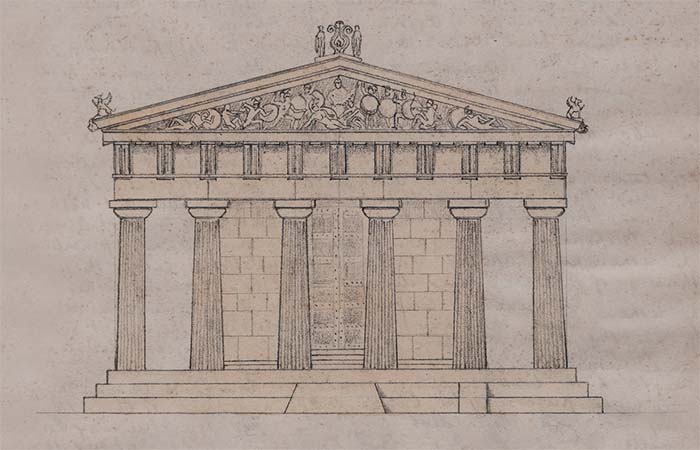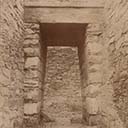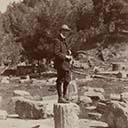κτῆμα τερπνὸν πᾶσιν ἀνθρώποιςThe pleasing property of all humanity ”Longus, 'Daphnis and Chloe' , prologue 3

John Henry Middleton, ‘Temple of Ellianos Zeus at Aegina, west elevation’, 1875, pencil on paper, GBR/3437/JHMN/1/1
The Faculty of Classics Archives collect, document, preserve, research and promote archival evidence of the study of the ancient Greek and Roman world. In particular, the archives hold primary source materials connected to the work of Classics Faculty staff and alumni across the five caucuses: Classical literature, ancient philosophy, ancient history, Classical art & archaeology and linguistics.
The archives digitised so far for the Faculty all centre upon the archaeologist Alan J. B. Wace (1879-1957), who read Classics at Pembroke College (matriculated 1898) and was later elected to the Laurence Professorship of Classical Archaeology in Cambridge (1934-1944). Wace first visited Greece in 1902, as a student at the British School in Athens, and later became Director of the School from 1914 to 1923. He is best known for his
excavations at the Bronze Age site of Mycenae
in the Peloponnese, which he initiated in 1920. However, he cut his archaeological teeth a decade earlier, excavating Neolithic sites in the region of Thessaly in Greece, between 1907 to 1910. Habitually Wace observed and recorded in his notebooks and his photography all aspects of daily life occurring around him – the local dialect, architecture and agriculture, celebratory customs, food and dress. Hence his documentary legacy is a rich resource that far exceeds the bounds of pure archaeological research.
Wace’s notebooks and photographs are now held predominantly in three archives: the Faculty of Classics and Pembroke College, University of Cambridge, and the British School at Athens (BSA). Upon Wace’s death in 1957, his widow Helen donated several of his field notebooks to his college. Further notebooks came to the Faculty of Classics in 2013 as part of a large gift of archives from Wace’s daughter, Dr Lisa French. Wace maintained a deep connection to the BSA for over five decades, with part of his life’s work also deposited there.
Digitisation enables a metaphorical collapse of geographical boundaries to reunite long separated text and images, consequently enabling the fullest understanding and enjoyment of documents as they were originally created: a continuous record of one man’s journeys, academic investigations and quotidian observations.
It is hoped that future digitisation projects will extend access to other important collections held in the Archives, such as the notebooks of the soldier-scholar-spy Colonel William Martin Leake (1777-1860), the notebooks of art historian and museum director John Henry Middleton (1846-1896) and the Papers of John Chadwick (1920-1998), the Cambridge classicist who assisted Michael Ventris in the decipherment of Linear B.
Archives | Faculty of Classics, University of Cambridge



